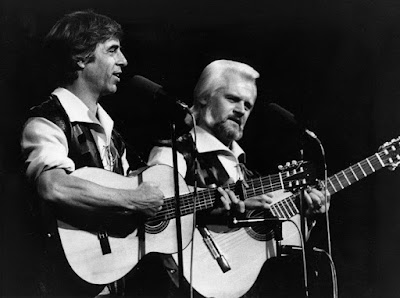.jpg) |
| The Proclaimers |
And the poetry and art. Since the 60s Scots have been singing in their own Scots and Gaelic voices – first with Flower of Scotland on the football terraces, the resurgence of Scots folk protest songs such as Hamish Henderson’s Freedom Come All Ye and then with the Proclaimers songs.
“Now everyone sings Scottish songs and if I were a unionist politician of whatever party, but especially the Labour party, I would be counting the songs, have a habit of making the laws also.” Ian Hamilton wrote.
Since the 60s and 70s, the resurgence of Scots voices, culture and arts have had more impact on our hearts and minds - than the often hollow and ignorant political chat. Early in 1970s Edinburgh, traditional folk songs were flourishing around the folk clubs, bars and folk festivals – Girvan, Ayr, Arran, Sandy Bells and many more.
Before this I had mainly listened to music on recorded albums, so the live local music scene was a revelation for me, with its foot-stomping fiddles, the strumming banjos, guitar and bohran, the perfect unaccompanied singers, and the traditional Scots ballads.
The impact of the Proclaimers first tv appearance on channel Four’s music program the Tube – when they performed Letter to American in strong Scottish accent was immediate. They combined folk and punk music. Then we also have dougie macLleans powerful Caledonia and David Steele's Scotland Yet.
As attitudes towards the British empire changed after the war, in the mid 1960s at the men’s football game they started to boo and agitate and to sing their own songs as the band played the national anthem, God Save the Queen. In 1966-67 fans started to sing Flower of Scotland – and eventually authorities recognised this and dropped the UK National Anthem for Scotland.
 |
| The Corries |
Ian Hamilton, who along with other student stole the Stone of Destiny from Westminster Abbey, wrote -
“Nobody sang in Scotland in the middle part of the century. To be more correct, those who sang did not derive their songs from Scotland. Their sources were foreign and what they sang was only an alien copy of other people’s ways of life.” He saw a very different Scotland in the early 1990s compared to the past: “Now everyone sings Scottish songs, and if I were a Unionist politician of whatever party, but especially of the Labour Party, I would be counting the songs, rather than the votes. The people who make the songs of a country have a habit of making the laws also.”
Perhaps that is a little too romantic for some but it contains a kernel of truth. What we sing and who sings says something about who we see ourselves as being and how we stake our claim in the world. Maybe in his heart, Ally McCoist knows this too.
Extracted The Songs We Sing, Gerry Hassan, The Sunday National 17th September 202 -
https://www.thenational.scot/news/23794397.gerry-hassan-god-save-king-flower-scotland-unites-us/



















